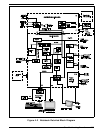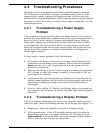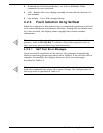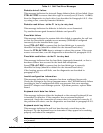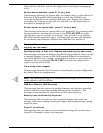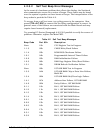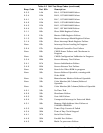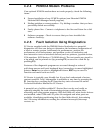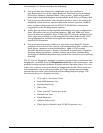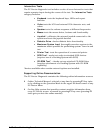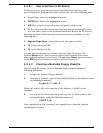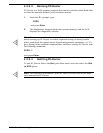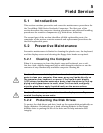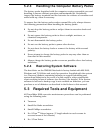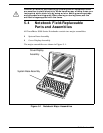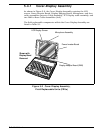
Functionally, PC-Doctor includes the following:
• Group of nine non-Interactive diagnostic tests that perform a
non-destructive test of the major hardware functions in the notebook
(Processor, Memory, System board, video section, serial and parallel
ports (when loopback adapters are installed), hard disk and floppy disk.
• Group of seven Interactive tests (require operator input) for testing the
keyboard, video sections, sound subsystem, mouse, joystick, diskette
drive, printer subsystem and the SCSI/CD-ROM Drive subsystems
supported by the docking station options.
• Utility that provides detailed system information such as configuration
data, allocation and use of system memory, IRQ and DMA use, what
device drivers are installed, what COM and LPT ports are assigned and
what ports are available, partitioning data for fixed disk drive(s), VGA
setup information, software interrupts and interrupt vectors, and
installed SCSI options.
• Group of special purpose utilities to run other tests from PC-Doctor,
perform a virus scan of the system, edit configuration files, surface scan
hard drives, measure system performance, open a DOS prompt,
provides terminal access to devices connected to serial ports, supports
memory debug operations, enables remote operations, permits deep
discharge of notebook batteries and provides an extensive test reporting
function.
The PC-Doctor diagnostic program contains a group of nine non-Interactive
diagnostics, available from the Diagnostics heading in the main menu, that
permits testing various hardware sections without operator input. You can
select one, several, or all tests from the Diagnostics menu. These tests are
non-destructive; the serial and parallel port tests require disconnecting
external devices from your notebook and installing loopback plugs. The
Non-Interactive test categories include:
• CPU and Co-Processor Tests
• Base RAM memory test
• System Board test
• Video Test
• Com1 and LPT1 serial port tests
• Parallel Port Test
• Fixed Disk test
• Diskette Drive tests
• Other devices (Sound card, PCMCIA options, etc.)
Troubleshooting Procedures 4-11



